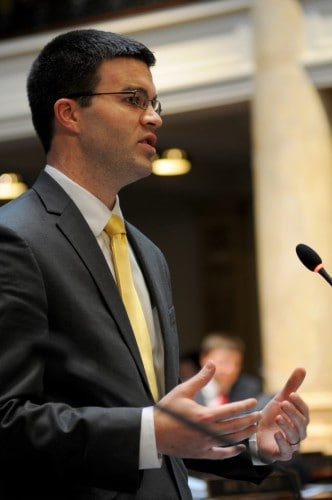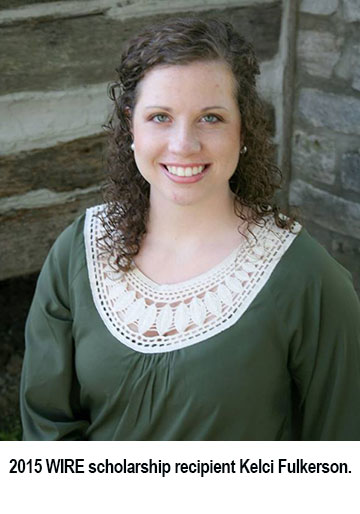Intrigue over the balance of power in Kentucky’s House of Representatives took a back seat to actual legislation in the 2016 General Assembly’s first full week on the job.
That said, three dates are circled on everyone’s calendar in Frankfort:
January 26 – Governor Matt Bevin’s joint State of the Commonwealth and Budget address.
March 8 – special elections to fill four vacancies in the House, where Democrats hold a four seat advantage, 50-46.
April 12 – “Sine Die” – the date the General Assembly consumes its 60th and constitutionally mandated final day of the session.
Bevin’s speech will come on the legislature’s 15th day. In the mean time, lawmakers are moving ahead, especially with bills which were either resurrected from previous years, or piggyback on previous initiatives.
The first bill to clear either chamber is Senate Bill 11, which aims to modernize Kentucky’s 1930s-era alcohol laws. Backed by the booming bourbon industry and craft beer makers, the bipartisan legislation sailed through the Senate by a 29-8 vote.
Bourbon tourism is at the heart of the comprehensive bill, which would increase the amount of packaged alcohol that can be sold at distilleries from three to nine liters. Sample sizes at distilleries would grow from 1 ounce to 1.5 ounces.
“You hear it said all the time: Government needs to just get out of the way and let industry work, let industry soar,” said Sen. John Schickel (R-Union), the bill’s sponsor. “Now, we really need to get out of the way of this bourbon industry and let it soar. If you go anywhere around the world someone will ask you about Kentucky bourbon.”
The bill, however, is not supported by all distilleries, including one in the Senate district of Sen. Joe Bowen of Owensboro.
“I’m very conflicted on this bill,” Bowen (R) said, while expressing support for alcohol-related business in Kentucky. “But at the end of the day, Mr. President, I simply feel that there are some inequities in this bill. There are some contradictions in this bill.”
The bill also:
- outlaws powdered alcohol;
- allows malt beverages to be sold at festivals;
- allows drinking on quadricycles, commonly called party bikes;
- specifies who pays for special elections to expand alcohol sales;
- allows bed and breakfasts to sell liquor by the drink;
- allows alcohol wholesalers to give discounts to retailers;
- allows brewers, distillers and vintners to taste their products for quality control;
- authorizes package liquor stores to give samples;
- and synchronizes all alcohol license renewal dates.
Joking that his Senate district also includes homegrown distilleries which are not legal, Senate President Robert Stivers (R-Manchester) expressed hope that the booming bourbon businesses would spread the wealth in the distressed economy of Eastern Kentucky, where the coal industry has been decimated.
“We have one wonderful resource in the east that is not carbon related and that is timber, white oak,” Stivers said. “I ask these icons who have asked us to help their industry … to help Eastern Kentucky by investing in that region of the state.”
The Senate also approved another alcohol-related measure; Senate Bill 12 would allow liquor sales at Kentucky Speedway in Sparta before 1 p.m. on Sundays.
The first bill to pass the Kentucky House also received bipartisan support. By an 80-11 vote, the lower chamber approved House Bill 40, which allows felonies to be expunged from the records of non-violent criminals.
Approximately 94,000 Kentuckians would be eligible to wipe their slates clean.
The bill would remove from public view the criminal records of Class D felons and those who were never formally accused or convicted of a Class D felony. The legislation also prohibits expunged files from being used in judicial or administrative proceedings involving hiring and other matters.
“There is an overwhelming and growing army of support for expunging the records of people who committed Class D felonies and helping these individuals become successful, productive, employable citizens of the commonwealth,” said House Judiciary Chair Rep. Darryl Owens (D-Louisville). Owens and Rep. David Floyd, (R-Bardstown) are primary sponsors of the bill, which is also supported by Governor Matt Bevin (R).
The Senate President, however, is expressing reservations.
“Am I opposed in theory to what they’re trying to do? Give the individual a second chance who’s not had any problems for five, 10, 12, 15 years? Had some juvenile indiscretions not necessarily being under the age of 18, but in their youth in college? No, I’m not opposed to that,” Stivers said. “I don’t think most people are. But it’s the method and manner of how you do it so you don’t open Pandora’s Box to more problems than you already have.”
Stivers said expungement of a felony conviction would not necessarily remove the conviction from court records, which could complicate employer background checks.
According to the Legislative Research Commission (LRC), convicted felons could ask the courts to expunge their records five years after completion of their sentence or probation; Those accused of a felony, but never indicted or convicted, could apply for expungement much sooner. Sex offenders, those who committed an offense against a child or vulnerable adult, those with a prior felony conviction, those who have recently been convicted of a misdemeanor or violation, or those against whom charges are pending would not be eligible for felony expungement under HB 40. The bill was amended by the House to also exclude those convicted of felonies involving abuse of public office, human trafficking and child pornography.
The LRC reports other legislation on the move in Frankfort includes:
- The Senate approved Senate Bill 9, which would exempt school and university construction projects of $250,000 or more from the state’s prevailing wage laws. The bill would cover the construction of school dormitories, administration buildings, sport facilities, parking facilities, and health facilities.
- House Bill 115 would expand eligibility for screenings under the state’s Colon Cancer Screening Program to uninsured Kentuckians between the ages of 50-64 or uninsured persons deemed at high risk for the disease. Eligibility would be based on current American Cancer Society screening guidelines. The bill was approved by the House Health and Welfare Committee and now goes to the full House for consideration.
- The Senate Standing Committee on State and Local Government approved Senate Bill 45, which would allow pension managers to disclose the name and benefit amount for any current or former lawmaker by making those figures subject to the state’s open records laws.
- The committee also approved Senate Bill 10, a constitutional amendment which would move election for governor and other statewide constitutional officers to even-numbered years when congressional and presidential elections are held. If it passes the General Assembly, the proposed change to the state Constitution would appear on the November ballot.
- The House Agriculture and Small Business Committee approved House Bill 83. The legislation sponsored by Rep. Tom McKee (D-Cynthiana) would expand the state’s definition of reference tobacco— tobacco products made by manufacturers specifically for research and not for public use—to include smokeless tobacco products like snuff and snus when the products are labeled specifically for tobacco-health research and experimental purposes. Current state law limits the definition of reference tobacco to cigarettes.
- The Senate Standing Committee on Health and Welfare sent Senate Bill 20 to the full senate. The legislation would create an independent review process for health care providers to appeal claims that have been denied by managed-care organizations (MCOs), private companies contracted by Kentucky to administer Medicaid. Under the current structure, appeals have to be made directly to the MCOs. The Kentucky attorney general’s office would be the independent arbitrator.
Joe Arnold (link sends e-mail), KAEC Vice-President of Strategic Communications


